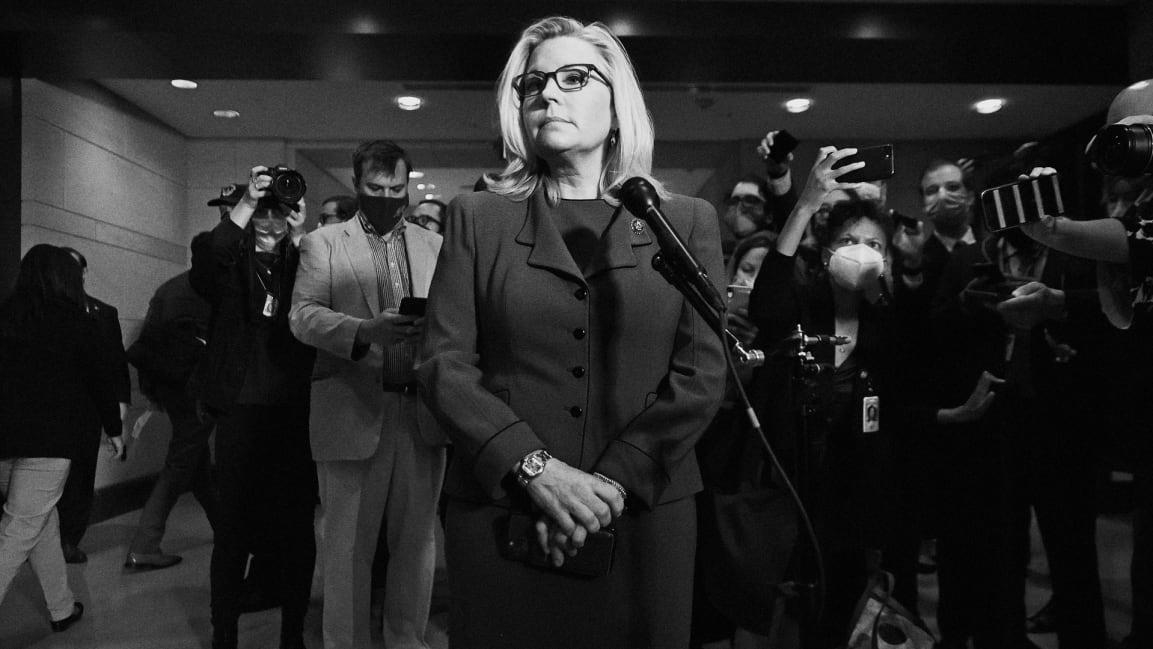With Liz Cheney’s ouster, the GOP is officially the cancel culture party
The people have spoken—and by “people,” I mean the Republicans, and by “have spoken,” I mean they’ve cemented their commitment to cancel culture.
As of Wednesday morning, House GOP Conference Chair Liz Cheney, the inspiration for the ClickHole headline, Heartbreaking: The Worst Person You Know Just Made a Great Point, is no longer in her leadership role. House Minority Leader Kevin McCarthy claims the party has purged Cheney because she is too focused on “relitigating the past,” and by “the past,” he means January 6, 2021. The truth, however, is plain and obvious for anyone to see. Cheney’s ouster is a direct result of her refusal to accept Donald Trump’s lies about the 2020 election, and the rest of the party’s refusal to accept any deviation from their chosen alternate reality.
“I will not sit back and watch in silence while others lead our party down a path that abandons the rule of law,” Cheney said on the night before the vote, during a fiery speech that was poorly attended, due to nearly all House Republicans deciding to walk out on it. (This move could be considered by some as “political theater,” though admittedly it does not conform with recent GOP definitions of the phrase, which include wearing a mask during a pandemic and attempting to enact gun control after a mass shooting.)
The idea that Cheney’s greatest sin is “looking backwards, not forwards” is pretty rich coming from a party currently performing a 2020 election audit in Arizona and clinging to the doffed red hat of its deposed former leader. It’s not even the most glaring hypocrisy around Cheney’s fate, though. No, that would probably be the nearly five months the GOP has spent painting “cancel culture” as the greatest threat to freedom, while also openly restricting voting rights just for certain people in states that Donald Trump lost in 2020.
Some quick background about what canceling means in this context. It’s a phrase that originated in Black culture to describe phenomena like people turning against Justin Timberlake after that Britney Spears documentary earlier this year, or people getting mad at a comedian for being racist earlier this week. “Justin Timberlake is canceled!” one might say in such a situation, meaning “I am mad at Justin Timberlake and I don’t know if he can fix it!”
At some point, however, the concept of canceling became conflated with several separate issues, including censorship, wrongful termination, and the idea of consequences in general. This year, that conflation exploded into an all-encompassing battle cry for the Republican party.
Senator Josh Hawley positioned himself as a symbol of cancel culture run amok upon losing corporate donors and a book deal with Simon & Schuster following his baseless vote to overturn the 2020 election results. Beyond Hawley’s self-martyrdom, Republicans decried cancel culture as the reason Donald Trump was banned from social media, the reason Dr. Seuss’s estate stopped printing some of its lesser-known tomes, the reason the Mr. Potato Head family of products is now known as simply ‘Potato Head,’ and of course, the reason that a horse was given performance-enhancing drugs.
All the Republican-led scaremongering around cancel culture isn’t about the mere fact that more people have means to demand consequences for bad behavior these days, but rather that the mechanism for delivering those consequences might be abused. Instead of confronting and debating each perceived abuse on the merits, people like Hawley and Senator Ted Cruz choose to denounce the murky broader concept of cancel culture altogether as a tool of the left for punishing “wrongthink.”
But what could be a more sterling example of precisely what the right portends to fear than the removal of Liz Cheney from its leadership for the crime of acknowledging reality! It’s even more brazen a hypocrisy considering that several party members, including Senator Mitch McConnell and Rep. McCarthy, agreed with Cheney’s assessment of reality just after the January insurrection, before GOP headwinds shifted toward unifying, once again, around disgraced former President Trump.
Hypocrisy is nothing new for Republicans, and certainly isn’t exclusive to them. However, cancel culture has been the party’s wedge issue du jour all year long, and it was driven by issues related to the very reason Liz Cheney has now been “canceled”—her views on the election and subsequent insurrection. The way that she and fellow Trump-condemner Senator Mitt Romney are being treated within the party now is just a flagrant, too-easily-provable, shameless, gross hypocrisy that cannot go unaddressed.
At the moment, more than 100 Republicans, including several former office-holders, are prepping a letter threatening to form a third party if the Republicans in power do not change course. It’s an empty threat, of course—third parties famously being difficult to establish as anything more than single-digit percent election-spoilers—but it proves that the distaste for Republican fealty to Donald Trump extends beyond the Democrats.
If the broader party refuses to heed this threat and continues excising all dissent from its ranks, however, the least it could do is stop also banging the drum about cancel culture.
“Unlike the left, we embrace free thought and debate,” McCarthy wrote in his letter announcing this week’s vote to strip Cheney of her leadership.
It’s a classic case of the pot calling the kettle a pot.
(28)



